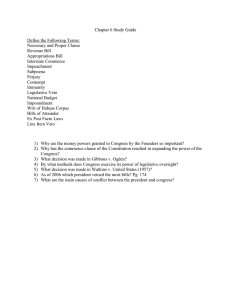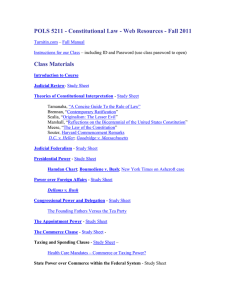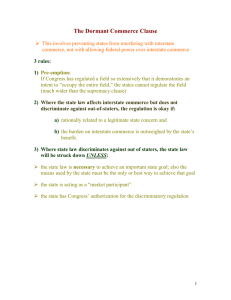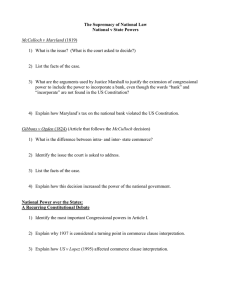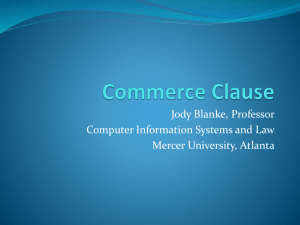CON LAW OUTLINE
advertisement
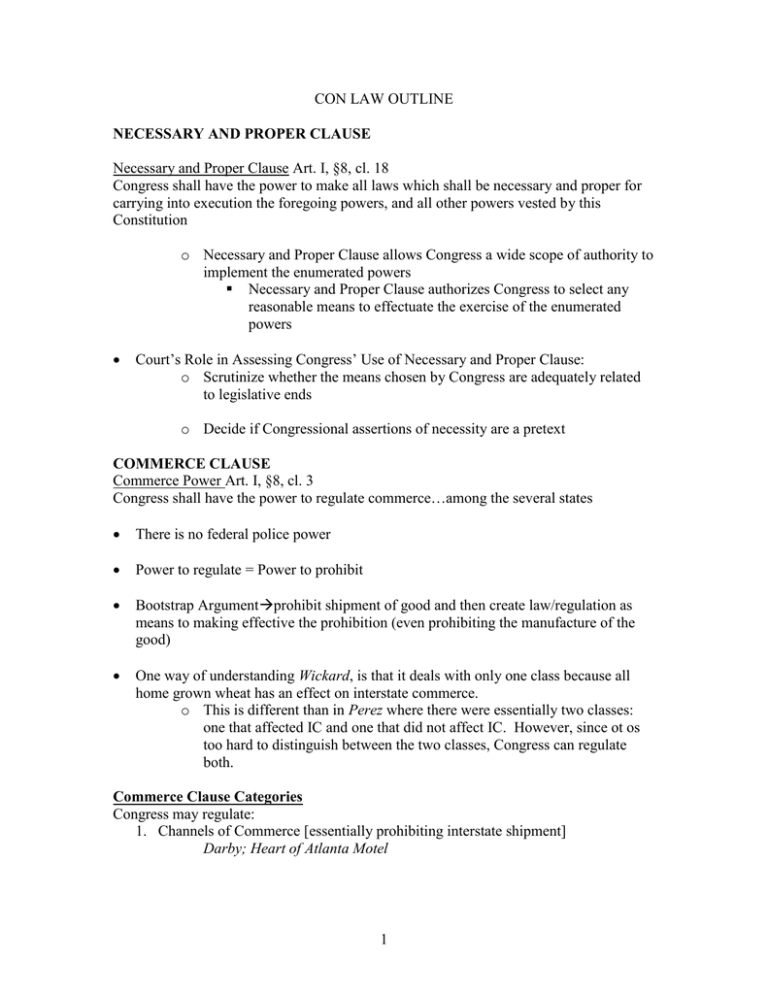
CON LAW OUTLINE NECESSARY AND PROPER CLAUSE Necessary and Proper Clause Art. I, §8, cl. 18 Congress shall have the power to make all laws which shall be necessary and proper for carrying into execution the foregoing powers, and all other powers vested by this Constitution o Necessary and Proper Clause allows Congress a wide scope of authority to implement the enumerated powers Necessary and Proper Clause authorizes Congress to select any reasonable means to effectuate the exercise of the enumerated powers Court’s Role in Assessing Congress’ Use of Necessary and Proper Clause: o Scrutinize whether the means chosen by Congress are adequately related to legislative ends o Decide if Congressional assertions of necessity are a pretext COMMERCE CLAUSE Commerce Power Art. I, §8, cl. 3 Congress shall have the power to regulate commerce…among the several states There is no federal police power Power to regulate = Power to prohibit Bootstrap Argumentprohibit shipment of good and then create law/regulation as means to making effective the prohibition (even prohibiting the manufacture of the good) One way of understanding Wickard, is that it deals with only one class because all home grown wheat has an effect on interstate commerce. o This is different than in Perez where there were essentially two classes: one that affected IC and one that did not affect IC. However, since ot os too hard to distinguish between the two classes, Congress can regulate both. Commerce Clause Categories Congress may regulate: 1. Channels of Commerce [essentially prohibiting interstate shipment] Darby; Heart of Atlanta Motel 1 2. Instrumentalities of Interstate Commerce [Things that facilitate commerce e.g. cars, trains, planes, specific forms of communication media] or Persons or Things in Interstate Commerce Shreveport Rate 3. Economic Activities that Substantially Affect Interstate Commerce Jones & Laughlin a. Economicrefers to the production, distribution, and consumption of commodities [Raich] b. Congress can regulate purely intrastate activity that is not itself commercial in that it is not produced for sale, if it concludes that failure to regulate that class of activity would undercut the regulation of the interstate market in that commodity. Raich Criticisms of Substantial Effects Analysis: Distinction between economic and non-economic is not meaningful e.g. If chemical emissions hurt the environment, why does it matter if they come from a home or factory? If all that it takes to make a statute valid is adding a jurisdictional hook, why bother with it at all? Congress NOT the court should strike the appropriate federal/state balance O’Connor in Printz believed that the majority’s decision did not preclude Congress from establishing purely ministerial reporting requirements. And Dissent in Five Gambling Devices believed that the distinction between obtaining information and regulating a substantial one. Regulating controlling interstate commerce itself: Carter Coal Shreveport Prohibiting Power Darby [15 (a)(1)] Champion Affecting commerce rational Darby [15 (a)(2)] Substantial effect: Maryland v. Wirtz Aggregate/Class effect Wickard Perez Narrow Statutory interpretation Deference to Congress’ interpretation 2 Heart of Atlanta Perez Bootstrap rationale [Don’t have much confidence in this argument] Sullivan Darby (alternative ground) Five Gambling Devices (accepted only by dissenting justices for information reporting) TAXING POWER Tax Power Art. I, §8, cl. 1 The Congress shall have the power to lay and collect taxes, duties, imposts and excises With all tax laws, argue one end = raising revenue Can be effective in reaching purely intrastate activities (activities that were unreachable under Commerce Clause) Can think of tax cases in two ways o Exercise of Necessary and Proper Clausetax as a means to executing another power o Exercise of the Tax Power itself to achieve the ends of an enumerated power Court generally does not inquire into Congress’ ends o If Congress has a purpose in addition to raising revenue, the tax will be valid so long as it’s a means to both raising revenue and the other purpose. If the tax is only a means to the other purpose, it’s probably not valid (see Bailey) May want to include a measure that requires persons to register with the IRS. This makes the tax easier to collect (it’s a means to the revenue raising end). In Bailey, the tax was struck down because the specifications were only a means to the end of suppressing child labor. Factors that may make something a penalty o Who’s enforcing the statute (e.g. Dept. of Labor helped to enforce Child Labor tax signified it was a penalty rather than a tax) o Is the tax the same for everyone (Child Labor tax taxed employers who employed a child for one day the same as an employer who employed children everyday) o Does the statute require knowledge (Knowledge requirements are typically associated with criminal sanctions) 3 U.S. v. Kahriger Upheld a tax on persons engaged in the business of accepting wagers and required such persons to register with the IRS. A federal excise tax does not cease to be valid merely because it discourages or deters the activities taxed. Nor is a tax invalid because the revenue obtained is negligible. RestraintUnless there are penalty provisions extraneous to any tax need, courts are without authority to limit the exercise of the taxing power. Court found that the registration provisions made the tax simpler to collect. The more expansive the conception of permissible federal regulation, the more attenuated the area of impermissible regulatory intrusion. SPENDING POWER Spending Power Art. I, §8, cl. 1 The Congress shall have the power to…pay the debts and provide for the common defense and general welfare of the United States According to the Court, the Spending Power is separate and distinct from the other enumerated powers [Hamilton’s view]. Congress can regulate through the use of the Spending Power + Necessary and Proper Clause o Congress can spend to provide for the general welfare. Under the Necessary and Proper Clause, Congress can impose conditions on its expenditures as a means to achieve its conceptions of the general welfare. WAR POWER Art. I, §8, cl. 11 The War Power does not necessarily end after an official declaration of the end of hostilities. The War Power may continue in order to remedy problems brought on by the conflict. (Woods v. Cloyd W. Miller Co) TREATY POWER Art. II, §2, cl. 2 No agreement with a foreign nation can confer power on the Congress, or on any other branch of government, which is free from the restraints of the Constitution Treaties are equal in status to Congressional legislation 4 Court rejected a Tenth Amendment limitation on the federal treaty power in Missouri v. Holland. Under the Necessary and Proper Clause, Congress can enact laws necessary to carry out a treaty, even if the law is in an area reserved to the States. o The Treaty power is delegated to the federal government and the Tenth Amendment only purports to apply to non-delegated powers. MODERN FEDERALISM LIMITS ON NATIONAL POWERS Theory as to why state cannot tax cannot tax national government (discriminatory tax) o When state taxes national government, the people of the state are not taxing themselves, instead, they are taxing the whole nation. People in other states do not have recourse to get rid of the tax because they cannot participate in the state’s political process. Theory as to why States could pass a non-discriminatory tax that affected the national government o The state constituents give the national instrumentality vicarious protection. If the tax is too burdensome, state constituents will get rid of the tax. Theory as to National tax on state instrumentalities is valid o Tax would have to apply uniformly to all states. The people of the nation are taxing themselves. Therefore, if the tax is too burdensome, they can participate in the political process to get rid of the tax. Old Tenth Amendment Test (Overturned in Garcia v. SAMTA) Federal law is invalid when: 1. Statute regulates “States as States” 2. Statute regulates matters that are indisputably attributes of state sovereignty 3. Compliance with the federal regulation directly impairs the state’s ability to structure integral operations in areas of traditional functions 4. Apply Balancing Test? After Garcia, Supreme Court will not use Tenth Amendment or federalism principles to restrict federal commercial legislation that applies to both private sector commercial activities and to state and local governments. Modern Immunities Rule There is no principled role for the judiciary in granting to state and local governments an area of immunity from otherwise valid federal commerce power legislation The political process is the primary safeguard for state and local governments against legislation which impaired their ability to act as sovereigns o State voters are not likely to re-elect Congressmen whose actions destroy the ability of their state and local governments to provide them with basic governmental services 5 o If legislation is non-discriminatory, government sector gets vicarious protection through private sector Shall = Compulsion, it does not give the States a choice Printz 3 Types of Commerce Clause Legislation 1. National laws that regulate private activity 2. National laws that regulate private + congruent State activity 3. National laws that require States the exercise State law affirmatively over private activity [Congress using the States to enforce national policy] Federal Government Can Influence State Policy Choices by: 1. Under Spending Power, Congress may attach conditions upon the receipt of federal funds 2. Where Congress has authority to regulate private activity under Commerce Clause, Congress can give the States the choice (cannot compel the State) of regulating the activity according to federal standards or having state law preempted by federal regulation The Constitution allows Congress to regulate individuals, not the States Under either option, State remains accountable to its citizens. The citizens retain the ultimate decision as to whether or not the State will comply Where Congress encourages state regulation rather than compelling it, state officials remain accountable to the people. However, where the Federal Government compels States to regulate, the accountability of both state and federal officials is diminished. o Where the federal government directs the States to regulate, it may be state officials who will bear the brunt of public disapproval, while the federal officials who devised the regulatory program may remain insulated from the electoral ramifications of their decision. o Accountability is thus diminished when, due to federal coercion, elected state officials cannot regulate in accordance with the views of the local electorate in matters not pre-empted by federal regulation. Federal government can’t compel States to enact a federal law/regulatory program Federal government can’t command state officers to enforce a federal law/ regulatory program o Blurs accountability What Congress Can Do if it Wants to Regulate Something in Commerce a Particular Way: 1. Regulate the activity directly 2. Use Spending Power by issuing conditional grants 6 3. Strengthen Commerce Powers of States meeting federal guidelines to discriminate against States who don’t An unambiguous indication of congressional intent is required before a federal statute will be read to authorize otherwise invalid state legislation (Maine v. Taylor) DORMANT COMMERCE CLAUSE Judicially created principle Congress can authorize what would otherwise be a violation of the dormant commerce clause Reasons Supporting Dormant Commerce Clause Principle: 1. HistoryCreation of Constitution in response to problems with Articles of Confederation where states were free to create trade barriers 2. Congress can effectively reverse a Court ruling by enacting federal legislation that approves that type of state law 3. Inner Political Check TheoryAll local persons affected by local legislation have the opportunity to participate in the democratic process that produces such legislation. Conversely, there is no political process designed to consider the interests of the out-of-state persons before the creation of state laws that shift costs to out-of-state persons. When a Law is Discriminatory (Dissent in Exxon): When the burden is significant When it falls on the most numerous and effective group of out-of-state competitors When a similar burden does not fall on the class of protected in-state businessmen When the State cannot justify the resulting disparity by showing that its legislation cannot be vindicated by more evenhanded regulation If a law discriminates on its face and has an economic purpose, one should argue the rule of virtual per se invalidity o Argue per se invalidity then apply Hunt Test Balancing test requires Court to inquire into real world results, not simply, did the legislature have a rational basis. Court defers to District Court’s factual findings unless they are clearly erroneous. If law eliminates all price competition, it will probably be struck down (Baldwin v. Seelig); however, if it only eliminates some competition it may be upheld (Henneford) 7 Ordinance that regulates on basis of in-city and out-of–city is still discriminatory because out-of-city residents/companies cannot participate in the in-city political process. A statute does not have to discriminate against ALL out-of-state interests to be discriminatory [Hunt; Dissent in Exxon] When law is non-discriminatory, consider whether in-state interests will really protect out-of-state interests. Ask, do the in-staters have something to gain from the law? According to majority in Philadelphia v. New Jersey, states have every right to protect their citizen’s pocketbooks, as well as their environment. (States can pass laws with economic purposes). When a state prohibits a good from being imported into the state, often a nondiscriminatory alternative is limiting the number/amount that can be shipped in. If an operation is state owned, it is arguably not discriminatory because local businesses are not gaining an advantage at the expense of out-of-state businesses. Therefore, the Pike test should be used. MARKET PARTICIPANT EXCEPTION When a State enters a market as a buyer or seller of goods, the State’s purchases and sales are exempt from the dormant Commerce Clause. NOTE: If State is Market Participant, may need to argue/apply Privileges and Immunities Analysis The Court allows for a market participant exception because it assumes when a State enters a market that it will be guided by profits. Generally, the State is still acting like a regulator because the State typically only enters the market if other regulation and subsidies have failed. Market Participant Doctrine allows a State to impose burdens on commerce within the market in which it is a participant, but allows it to go no further. o State can CANNOT impose conditions, whether by statute, regulation, or contract, that have a substantial regulatory effect outside of the particular market in which the State participates. PRIVILEGES AND IMMUNITIES CLAUSE Privileges and Immunities Clause Art. IV, §2, cl. 1 The citizens of each state shall be entitled to all privileges and immunities of citizens of the several states Purpose of P&I Clauseensure a citizen of State A who ventures into State B the same privileges which the citizens of State B enjoy. 8 Why can something be valid under Dormant Commerce Clause but invalid under P&I Clause? o Dormant commerce clause is concerned with the balance of regulatory power. When the state is not a regulator but instead a market participant, then there are no dormant commerce clause concerns. o P&I Clause is not only concerned with burdens on interstate commerce but also (and more importantly), interstate harmony. Concern of rivalries between states exists whether state/municipality is market regulator or market participant. Difference Between Commerce Clause and Privileges and Immunities Clause 1. P&I Clause may only be used in cases where the local law discriminates against out-of-state residents while Commerce Clause can be used in cases where the law affects in-state residents, out-of-state residents, or both 2. Corporations and Foreigners are NOT protected under the P&I Clause 3. Congressional approval may excuse a statute in violation of the Commerce Clause, but cannot excuse a law that violates the P&I Clause 4. No market participant exception to P&I Clause PREEMPTION Supremacy Clause Art. VI, cl. 2 This Constitution, and the Laws of the United States which shall b made in pursuance thereof, and all Treaties made, or which shall be made, under the Authority of the United States shall be the supreme law of the land If a law is challenged under dormant commerce clause and preemption, Court will address preemption issue first The Supreme Court presumes that Congress did not intend to preempt state legislation unless there is an appropriate indication from the language or purposes of the federal action or regulation. Nonetheless, the Court may find part, or all, of a state law preempted because of the Court’s interpretation of the intent of purpose of federal law With preemption questions, ALWAYS look for a preemption or savings clause 9 JUDICIAL REVIEW a. Can the Supreme Court issue a mandamus against officers of the executive branch? o The actions of the executive branch are subject to review under both the Constitution and laws of the United States except: Where the action was in its nature political Where Constitution or federal law placed a subject matter within sole discretion of the executive o Where a duty is assigned by law, and individual rights depend upon the performance of that duty, the judiciary can intervene. b. Can the Court issue a mandamus in this case? o Marshall found a conflict between the Court’s statutory jurisdiction and that fixed by Article III Section 13 of Judiciary Act of 1789 authorized original actions in the Supreme Court for writs of mandamus but Article III did not. o Congress can change the Court’s appellate jurisdiction but its original jurisdiction is fixed by Article III o The fact that the people chose a written Constitution with fundamental principles to bind government in the future was evidence that the Constitution should be superior and binding law. Therefore, an act repugnant to the Constitution must be invalid. o Duty of the judiciary to say what the law is. Since the Constitution is the superior law in the nation, the judiciary has the final authority on matters of constitutional interpretation. Does the Supreme Court have the power to review the constitutionality of an act of Congress? o Yes. It is the duty of the judiciary to say what the law is. Could interpret Marshall’s judicial review ruling in 3 different ways: o Narrowest HoldingIn litigation before the Supreme Court, the Court may refuse to give effect to an act of Congress that it believes is unconstitutional where the statute applies to the exercise of judicial power. o Middle HoldingThe Supreme Court has the authority to decide all Constitutional issues in any case within its jurisdiction. Allows for Legislature and Executive to decide Constitutional issues as well. 10 o Broadest HoldingThe Supreme Court has a special and distinct role in interpreting the Constitution. All other branches should defer to the Supreme Court’s understanding of the Constitution. Martin v. Hunter’s Lessee Holding: Supreme Court had the jurisdiction and authority to review all state acts under the Constitution, laws and treatises of the United States. 1789 Judiciary Act §25 Supreme Court has appellate jurisdiction where: 1. Where is drawn in question the validity of a treaty or a statute of, or an authority exercised under, the United States, and the lower court’s decision is against there validity 2. Where is drawn in question the validity of a statute of, or an authority exercised under, any State, on the ground of their being repugnant to the Constitution, treatises, or laws of the United States, and the decision of the lower court is in favor of their validity 3. Where is drawn in question the construction of any clause of the constitution, or of a treaty, or statute of, or commission held under, the United States, and the decision is against the title, right, privilege, or exemption, specially set up or claimed by either party, under such clause of the said Constitution, treaty, statute, or commission Supreme Court can get jurisdiction in two ways: o Character of the Case/Type of Issue involved e.g. Federal Question Jurisdiction o Character of the Parties e.g. Controversies arising between citizens of different states Why Supreme Court can review State Court Decisions: o Framers did not establish lower federal courts in Constitution because federal interests were adequately protected by the possibility of Supreme Court review of State Court decisions o Plain reading of Art. III, §2, Cl. 2 o When people set up a central government, they decided to limit state sovereignty through a Constitution that restricted State acts in a variety of ways o Supremacy Clause 11

